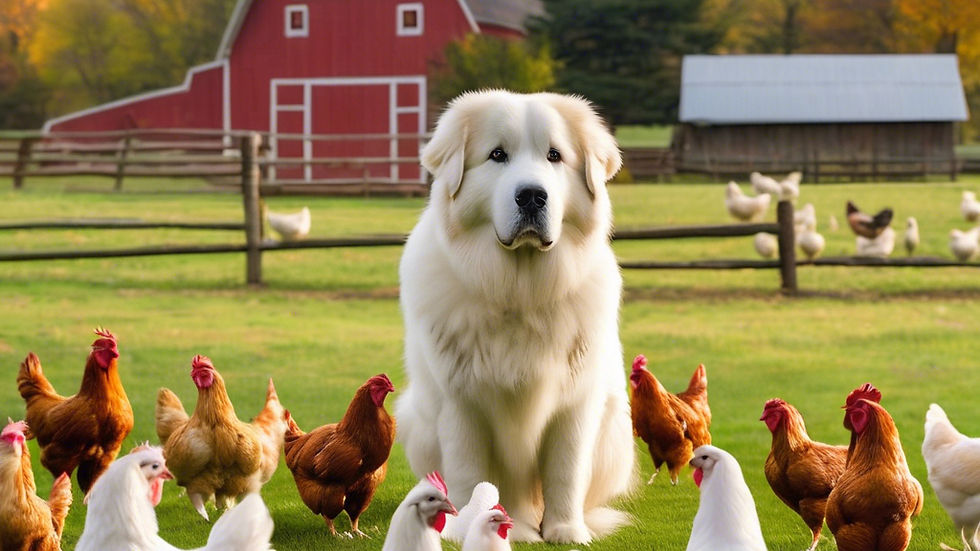The Essential Role of Livestock Guardians in Modern Farming
- Lulu's Farm

- Jun 27, 2025
- 3 min read
Updated: Jul 28, 2025
In today’s farming landscape, the safety and well-being of livestock are crucial. Farmers who care for their animals understand the importance of protecting them from various threats, including predators like coyotes, foxes, and even bears. One of the most effective and heartwarming solutions for this challenge is employing a livestock guardian. These devoted animals don’t just keep watch; they also greatly enhance the overall health and calm of your farm. Let’s explore the many benefits that livestock guardians can bring to your farming operation!
Understanding Livestock Guardians
Livestock guardians, which are often dogs, donkeys, or llamas, are specially trained to protect farm animals from threats. They build strong bonds with the livestock they guard, enabling them to instinctively sense danger. Their presence can be a major deterrent against wildlife, transforming your farm into a safer haven. For instance, breeds like the Great Pyrenees and Maremma excel in this role, maintaining a calming influence while ensuring safety.
Enhanced Protection Against Predators
One of the standout advantages of livestock guardians is their unparalleled ability to defend against predators. Statistics reveal that farms with effective guardians can see a dramatic reduction in livestock losses—by as much as 90%. Guardians are alert and can detect unusual activities around the farm.
When a threat approaches, a trained guardian might bark loudly, run toward the danger, or position itself between the predator and the livestock. This active response not only protects the animals but also provides farmers with peace of mind, knowing they have a gatekeeper watching over their herd.
Promoting a Healthy and Stress-Free Environment
Livestock guardians help create a healthier environment for your animals, significantly reducing their stress levels. Research indicates that stress-free livestock can produce 20-30% more milk and experience better growth rates. When animals feel safe, they exhibit calm behaviors, leading to improved health and productivity.
Moreover, guardians often sleep among the livestock, providing a comforting presence that enhances the animals' security and well-being.
Cost Efficiency: A Smart Investment
Although hiring a guardian may seem expensive initially, the long-term savings make it worthwhile. The average cost of replacing lost livestock can exceed hundreds to thousands of dollars. Additionally, veterinary bills can quickly accumulate after predator attacks.
Farmers who report losses without guardians can experience a 15% drop in overall profits due to livestock loss and stress-related issues. In contrast, the presence of a guardian means reduced costs in replacements and veterinary care, promoting a sound investment in the long run.

Eco-Friendly Alternative to Predator Control
Using livestock guardians is an eco-friendly and sustainable strategy for predator control. Instead of relying on traps or poisons, which can harm the environment, guardians work naturally to maintain balance. In fact, farms that employ guardian animals often report biodiversity increases due to healthier ecosystems.
This approach aligns perfectly with organic farming principles, protecting not just the livestock but also local wildlife. Such sustainable practices can improve your farm's reputation in a market increasingly focused on environmentally friendly methods.
Companion Animals: Strengthening Emotional Bonds
Beyond their protective roles, livestock guardians offer companionship to both animals and humans, enriching the farming experience. Their playful behavior fosters positive relationships, boosting trust among the livestock.
Studies show that farms with engaged livestock have lower stress levels and a more harmonious social structure, which translates into happier, healthier animals. The companionship provided by guardians elevates the overall atmosphere on the farm.
Versatility in Guardianship
While many farmers opt for dogs as guardians, other remarkable options include donkeys and llamas. Donkeys, for example, are known for their loud braying that can scare away potential threats. Llamas have a natural instinct to protect and can bond closely with the flock they guard.
This variety allows farmers to choose guardians that best fit their specific needs and the environment of their farm.
Training Your Livestock Guardian
Effective training is crucial for a livestock guardian to truly shine. Socializing the guardian with the livestock from a young age is essential for developing their protective instincts. Positive reinforcement is key, helping shape the guardian's behavior over time.
It’s important to provide ample space for the guardian to patrol along with a secure living environment. Dedicating time to training today will ensure a reliable protector for years to come.
Unlocking the Potential of Livestock Guardians
Incorporating a livestock guardian into your farming operations can significantly boost security and productivity. From preventing predator attacks to nurturing healthier livestock relationships, these protective animals are invaluable.
If you are considering ways to improve safety and sustainability on your farm, think about adding a livestock guardian to your resources. Not only will you enhance the welfare of your livestock, but you will also embrace the joy and companionship these loyal guardians can provide.
Explore the hidden power of livestock guardians and watch your farm flourish like never before!





Comments